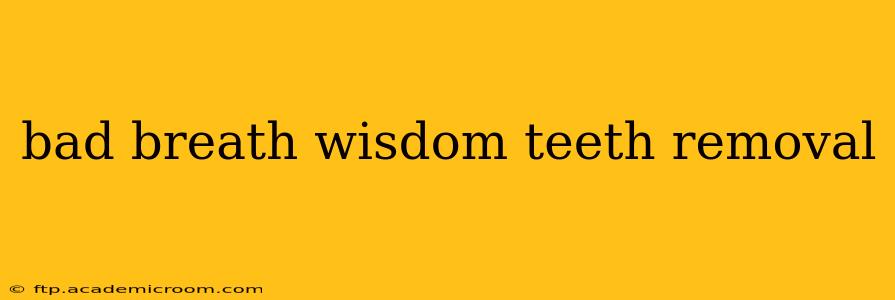Wisdom teeth removal is a common procedure, but it can sometimes lead to unpleasant side effects, including bad breath (halitosis). Understanding the causes of post-operative bad breath is crucial for effective prevention and treatment. This comprehensive guide will explore the reasons behind this issue, offer practical prevention strategies, and outline potential treatment options.
Why Does Wisdom Teeth Removal Cause Bad Breath?
The primary reason for bad breath after wisdom teeth removal is the presence of blood clots and food debris in the extraction sites. These provide a breeding ground for bacteria, which produce volatile sulfur compounds (VSCs), the primary culprits behind halitosis. The healing process itself, involving inflammation and tissue breakdown, can also contribute to the problem.
What are the common causes of bad breath after wisdom tooth extraction?
- Blood clots: The initial blood clot formation is essential for healing, but if disturbed, it can expose underlying bone and tissue, creating an ideal environment for bacterial growth.
- Food debris: Food particles trapped in the extraction sockets can decompose, adding to the bacterial load and resulting in unpleasant odors.
- Infection: In some cases, a dry socket (alveolar osteitis) can develop, leading to significant pain and bad breath due to exposed bone. Infection at the extraction site is another potential cause.
- Poor oral hygiene: Neglecting oral hygiene practices following the surgery increases the risk of bacterial build-up and subsequent bad breath.
- Medications: Some medications can have side effects that contribute to dry mouth (xerostomia), which can indirectly lead to bad breath.
How long does bad breath last after wisdom teeth removal?
The duration of bad breath after wisdom teeth removal varies, typically lasting a few days to a couple of weeks. However, persistent bad breath beyond this period could indicate an underlying problem requiring professional attention. Proper post-operative care significantly influences the duration.
Preventing Bad Breath After Wisdom Tooth Extraction
Proactive measures are key to minimizing the risk of post-operative bad breath. Here are some essential steps:
- Follow your dentist's instructions carefully: Adherence to post-operative instructions, including rinsing and medication usage, is critical.
- Maintain meticulous oral hygiene: Gentle brushing and rinsing (as instructed by your dentist) help remove food particles and prevent bacterial growth. Avoid aggressive brushing or rinsing near the extraction sites.
- Eat a soft food diet: Opt for soft, easily chewed foods in the initial days to avoid disturbing the blood clots.
- Stay hydrated: Drinking plenty of water promotes saliva production, which helps neutralize acids and flush away bacteria.
- Avoid smoking and alcohol: These substances hinder healing and increase the risk of infection and bad breath.
Can I use mouthwash after wisdom tooth removal?
Yes, but only use mouthwashes specifically recommended by your dentist or oral surgeon. Avoid alcohol-based mouthwashes, as they can irritate the extraction sites. Often, a prescribed antiseptic mouthwash will be provided to help prevent infection.
How can I get rid of bad breath after wisdom teeth removal?
Gentle rinsing with salt water (a warm salt water rinse can be very soothing), following your dentist’s instructions, is a helpful strategy. Maintaining excellent oral hygiene, avoiding irritating foods, and staying well hydrated are crucial steps towards eliminating bad breath.
Treating Persistent Bad Breath After Wisdom Teeth Removal
If bad breath persists beyond a reasonable timeframe or is accompanied by other symptoms like pain, swelling, or fever, seek immediate dental attention. Your dentist can assess the situation and determine the underlying cause, providing appropriate treatment.
What should I do if I have persistent bad breath after wisdom tooth removal?
Contact your dentist or oral surgeon immediately. Persistent bad breath might signal a more serious issue like infection or a dry socket, requiring professional intervention.
In conclusion, while bad breath is a relatively common occurrence after wisdom teeth removal, understanding its causes and taking preventive measures can significantly reduce its duration and severity. Always consult your dentist or oral surgeon for any concerns regarding post-operative complications, ensuring timely and appropriate treatment. Remember, proper post-operative care is essential for optimal healing and minimizing discomfort.
